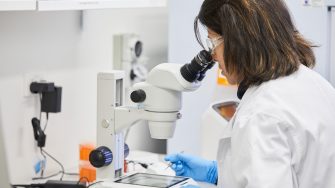
A/Prof Mark Danta heads the Gastrointestinal, Liver and Microbiome Research Unit at the St Vincent’s Centre of Applied Medical Research at St Vincent’s Hospital. The unit provides leadership, particularly in the translation from clinical medicine to the bench and vice versa, to enhance the outcomes of any patient treatment. This includes: clinical medicine, laboratory-based virology and immunology research, qualitative methods, and epidemiology.
Our goals
The unit’s research focuses on collaborative clinical translational research studies of the gastrointestinal immune system, microbiome, cirrhosis and its complications, hepatocellular cancer and non-invasive assessment of liver fibrosis.The liver focus is supervised by A/Prof Mark Danta, Dr Ian Lockart and A/Prof Robert Feller. The Inflammatory Bowel Disease focus is led by Dr Simon Ghaly and Dr Craig Haifer.
The unit has funding from National Health and Medical Research Council (NH&MRC), NSW Cancer Council, UNSW, St Vincent’s Clinic Foundation and the St Vincent’s Hospital Curran Foundation. The unit has ongoing research collaborations with the Kirby Institute, Garvan Institute, UNSW, Charles Perkins Institute and UTS. We also run a number of Pharma trials exploring novel therapies in liver disease, liver cancer and IBD. Currently, we have two PhD students and five honours students.
Research strengths
Our research strengths are built around our clinical activities and collaborations including:
Clinical medicine
Laboratory-based virology and immunology research
Qualitative methods
Epidemiology
Our projects
- Determining factors associated with bone loss in a prospective cohort of patient with inflammatory bowel disease. This is a longitudinal study in collaboration with Prof. Jacqueline Center from the Garvan Institute looking at clinical and biochemical determinants of bone loss in IBD patients with the goal of developing an IBD specific risk calculator. The project has received funding from the St. Vincent’s clinic foundation and has ethical approval.
- Metabolic Monitoring of the Microbiome in Liver disease (3M-G) study: Diseases of the gut such as IBD and liver disease are influenced by unhealthy microbiomes. Monitoring the body’s pattern of blood glucose levels after eating has the potential to provide important data on the complex interaction between the microbiome and the body in disease. Identifying healthy glucose patterns to specific foods, personalised diet interventions could be developed to treat these diseases– a form of precision medicine.
- HCC Clinical Cohort: Hepatocellular carcinoma is a poor prognosis cancer that complicates cirrhosis. We have initiated a multicentre clinical cohort study to understand the management and prognosis over time of HCC in NSW. This allows the evaluation of therapeutic guidelines within the cohort with the aim of improving the outcome of HCC.
- Thromboelastography is a functional measure of clotting. The RoTiLD study will compare thromboelastography using ROTEM to standard clotting bleeding tests with the aim to determine whether ROTEM is a better method of predicting and mitigating bleeding risk in cirrhotic patients undergoing invasive procedures.
- Viral hepatitis and bone disease – a data-linkage study: Chronic liver disease and some viral hepatitis treatments are risk factors for osteoporosis. Using NSW-wide linkage of viral hepatitis notification and various databases that include hospitalisation, MBS and PBS data the correlation between viral hepatitis, treatment and bone disease will be explored.
- Urine study for HCC: The primary objective of the study is to evaluate the performance of the MCH Test Kit evaluating urine amino acid patterns in detecting malignant liver tumour from individuals with definite hepatocellular carcinoma. This is a prospective single centre study.
- Utility of frailty in management of HCC: In a state-wide study of liver multidisciplinary team (MDT) meetings we will evaluate whether the assessment of frailty in this population impacts prognosis and treatment outcome. If frailty is an important factor it may become a component of the assessment of this population.
- Faecal Microbiota Transplantation in Immune Checkpoint Inhibitor Colitis –Immune Checkpoint Inhibitors are being used for an increasing number of cancers and we are seeing an increasing incidence of immune mediated side effects including colitis. FMT has been shown to be efficacious in the treatment of C.difficile infection and ulcerative colitis and its utility is being explored in various other indications. We aim to evaluate the efficacy of using FMT in immune checkpoint inhibitor associated colitis.
Our results
We provide leadership in gastrointestinal, liver and microbiome research locally, nationally and internationally through our commitment to research, teaching and training, advisory roles and collaborations.

